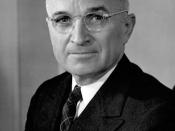Modernity is the second form of colonization
The direct colonial rule, which has been gradually vanished after the Second World War, seemed to produce heartening era. After suffering a period of colonization in which sovereignty and independence was no where in sight, colonized people can at last enjoyed the luxury of their own state. However, It did not take long to see that the decline of colonial empires does not always produce an independent nation. The former powers are still in charge. Existing in the more sophisticated form rather than disappeared, the 'mission of civilization' continues to be executed. The United States, acquiring the status of superpower after the European hegemony, turned to be a dominant actor in completing the mission. The more complex the method is, the more the effect will be thorough and holistic, and the less it is aware of.
The purpose of this essay is to prove that there are, despite some exceptions, solid reasons to hold the statement that modernity is the second form of colonization as being true.
It will do that by firstly examining the common ideas and assumptions modernity, achieved through modernization process, shares with colonization. It will then trace the process and means which modernization and colonization use to achieve different ends, yet the similar goal is maintained, i.e. the superior status of the hegemonic superpower. Along with that the theory and frameworks arisen in the ongoing status will be considered. The term "modernity" and "modernization" is used here interchangeably, although the former suggests the status more than the process, yet its nature provides the appeal for me to think of modernity as an end as well as a mean in itself.
Being the end the United States want so many countries to reach, modernity's ground is in linear,


